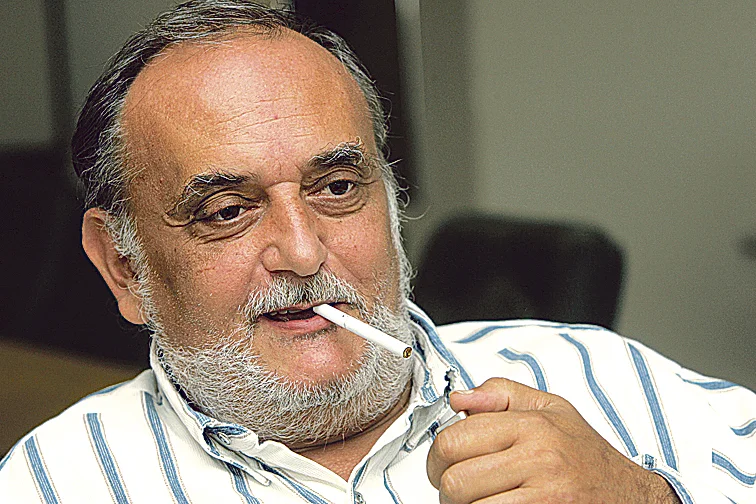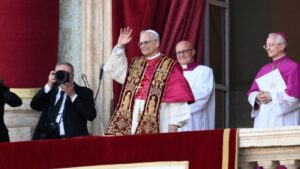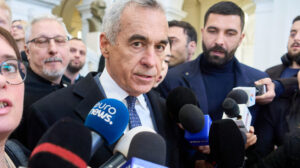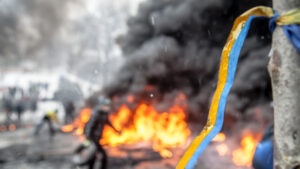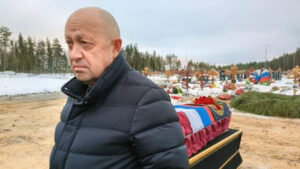«The state should sell all it can sell: the telecommunications, the railroads, the electricity networks. This should be followed by the two kinds of privatisation: giving back the confiscated property and the big privatisation. (…) All these measures should be accompanied by cutting taxes at least by half.» Such ideas, some of them still seen as revolutionary, were exposed by Dinu Patriciu in the first interview he gave to Capital more than 20 years ago (in November 1993 to be precise). At that time, Patriciu was mainly known by his political activity and less for his business operations (even if the main company of his group, Alpha SA, had been the first private enterprise incorporated in Romania after the fall of the communism in December 1989).
16 years later, in 2009, just few months after the recession had hit the country, Patriciu gave a new interview for Capital. This time, as holder of the third position in the Romanian Rich List, with a fortune estimated at 2-2.1 billion EUR. The mogul was still embracing a rightwing and libertarian speech. «The state is the worst administrator, it misspends the taxpayers’ money and it’s only capable of stealing some people’s prosperity and then thievishly become a profiteer of the redistribution process», he was saying. Unless this time his words sounded a little empty, at least for some people.
Falling from the sky
In the previous 15 years, Patriciu had been involved in a series of controversial deals with the very state he didn’t stop criticising. For example, in 2000 he bought the Petromidia refinery, committing himself to paying the almost 350 million USD debts the company had to the state and to invest over 200 million USD for upgrading the refinery. Three years later, the Petromidia debts, which had arrived to 571 million EUR, had been converted into bonds by the Romanian government led by the Social-Democrat Prime Minister Adrian Nastase.
Patriciu is the same who, according to the National Anticorruption Department prosecutors, illegally laid hands on the so-called Libyan debt – 85 million USD owned by the Tripoli government to the Romanian state as result of the services Rompetrol provided before Patriciu bought the company. The businessman was sent to trial for taking possession of the Libyan money, but he was acquitted in 2012. The prosecutors appealed, but the judges didn’t take yet a final decision.
Beyond these energy sector-related controversies, the tycoon’s image was also debunked by the numerous bankruptcies and insolvencies involving his companies in the past few years. Among others, the retail networks Patriciu owned (mic.ro and Minimax Discount) went out of business, some office buildings from his real estate portfolio were confiscated and the media group Adevarul Holding was sold while in insolvency. “I invested with obstinacy in Romania, where I lost half a billion euros”, Patriciu revealed in 2013. His direct and, as some said, not entirely honest involvement in the political battles (like sponsoring several parties in parallel or popping up a controversial video during the 2009 presidential elections campaign) also reduced the number of his fans.
However, in the end there were not the uninspired or unlucky business decisions, nor the controversial political involvements or the legal problems that put Patriciu out of action. In the past years, he stood aside due to some serious health problems and in December 2012 he was subject of a liver transplant intervention in a Milan clinic. Even if the procedure was initially a success, it’s possible his August 2014 death was caused by a post-transplant complication. As the doctors said, most probably Patriciu’s weak immune system didn’t have the strength to fight an infection. The emotional impact of the bankruptcies, especially the one of mic.ro, a project he placed his reliance in, also might have played a big role in his health deterioration process.
War at home
Patriciu’s last years were also complicated in terms of personal life. The businessman was married, since 1994, with Dana Patriciu. The two had both children from previous marriages: Ana, 31, and Maria, 26, were Dinu’s daughters from his relationship with Sabina Rosianu, while Andrei Stefan, 36, was Dana’s son from her marriage with Dinu Stefan. In February 2012, rumours regarding an imminent divorce in the Patriciu family started spreading around stronger and stronger. Media reports from that period indicated the couple had separated since the fall of 2011.
The rumours were followed, in December 2012, by an official wealth sharing request filed in by Dana Patriciu. She was claiming her husband developed a lack of discernment and that he apparently already sold some of the jointly owned assets without her consent. After managing to decrease the compulsory court fees from 70 million EUR to “only” 7.5 million EUR, Dana Patriciu was currently waiting for the next hearing in the lawsuit, which was supposed to take place on 27 August. The stake was couple’s fortune, estimated by the wife at 2.3 billion EUR and by the husband at 191 million EUR (of which, he said, he should have received 97%).
Meanwhile, in the spring of 2013, Dinu Patriciu had officially asked for the divorce. In June 2014, his request was rejected by the Buftea Court of Law as “unsupported”. The court also decided to open a new divorce proceeding, having Dana Patriciu as plaintiff. But on 29 July the tycoon’s lawyers appealed. Nowadays, both legal disputes reached a sudden end.
Cherchez la femme!
According to information published by the Romanian media since 2012, one of the main reasons of the tensions among the Patricius was allegedly a woman 20 years younger than the businessman. Of Caribbean and Chinese origins, Melanie Anne Chen allegedly gradually entered, since 2007, not only Patriciu’s office and at some point she arrived to controlling both his personal life and business operations. Sources around Patriciu, quoted by the local media in the past year and a half, said Melanie Chen owned a special power of attorney which gave her the right to administrate all Patriciu’s companies and assets. She was allegedly supported in all her actions by her brother, Peter Chen, who was apparently managing Patriciu’s capital investment operations. There were rumours from 2012 saying that Chen’s not so inspired decisions had diminished by 250 million euros the tycoon’s accounts.
The conflict involving the spouses led to some disputes between the businessman and his stepson. Dinu Patriciu found himself sued by Andrei Stefan for some alleged overdue debts. Meanwhile, media reported about some problems between Patriciu’s daughter Ana and the purported mistress. Two years ago, Melanie Chen allegedly refused to pay the taxes for a company where Ana was the appointed administrator. As result, the young woman was apparently prosecuted for tax evasion.
The ongoing disputes
In other words, the things the famous Romanian businessman left behind are indeed entangled. Information following his death indicates the fortune division issue will be at least as complex, not only because Patriciu was, for several years in a row, considered the richest Romanian. Taking into account his death occurred in London, where apparently he was also domiciled in the past years, there are big chances his inheritance will be distributed according to the United Kingdom law.
According to the Romanian regulations, the surviving spouse automatically receives half of the assets acquired during the marriage and a quarter of the second half, the rest being assigned to the couple’s children. In Great Britain, the remaining spouse only gets half of the assets or accounts jointly owned. As the available information indicates, the vast majority of Patriciu’s properties and accounts were registered only on his name. However, according to the British law, Dana Patriciu might receive assets of 250,000 pounds and the life interest in half of the remaining estate. But –very important!- only if there is not a will according to which her husband decided the fortune to be divided in a different way. And as it seems that he left behind such a document, most probably the legal disputes between Dana and Dinu Patriciu will go on after death.
Quotes
The state should sell all it can sell: the telecommunications, the railroads, the electricity networks. This should be followed by the two kinds of privatisation: giving back the property and the big privatisation
Dinu Patriciu, 1993
Whole Romania still lives with the communist mentality, rejects the capitalist success and considers the wealth can only be gathered by theft, because that’s what we were taught for 50 years.
Dinu Patriciu, 2005
If you abandon me tomorrow morning without any money in downtown Bucharest, most probably in a year I’ll be at the same level as today. My fortune is made with intelligence and ideas. I have no doubt I’ll be the same in a year.
Dinu Patriciu, 2008
The state is the worst administrator, it misspends the taxpayers’ money and it’s only capable of stealing some people’s prosperity and then thievishly become a profiteer of the redistribution process
Dinu Patriciu, 2009
I was motivated to live and that’s the state I was living in. I wanted to hang on to life. The fact that I made it was a hazard. But if you want something really bad you can do it.
Dinu Patriciu, 2013, after the liver transplant
I have a certain dose of stupidity. Because I invested with obstinacy in Romania, where I lost half a billion euros. But the same way I lost this money I will earn it back. It’s not a problem.
Dinu Patriciu, 2013

